Self-awareness is one of the most important abilities you can ever develop in your life. Awareness enables you to make better decisions and design your perfect life.
And the best free personality tests is a powerful external tool to gain self-insights.
Why?
They provide a unique perspective on your strengths, needs, values, motivations, and so much more. These insights can help you to discover who you are, pick your ideal career, make better decisions, and enjoy better relationships.
For this review, I took every popular online personality test on the market. And I’ll list the 7 best personality tests you can take for free.
Let’s dive in!
- Verdict
- What are personality tests?
- A brief history of personality tests
- What is the purpose of a personality test?
- 5 Most popular types of personality tests
- Other personality tests you might know
- How to use your personality test results?
- Why you should take multiple tests
Disclosure: This post contains affiliate links, so if you buy something through my link, I earn a small commission at no extra cost to you. Note that I only endorse products that I’ve personally bought and enjoyed.
Verdict: The best free personality tests
Here’s a summarized overview of the best types of personality tests:
- The Myers-Briggs Type Indicator (MBTI), also known as the 16 personality test, is my top favorite. The results are easy to understand and cover all you want to know about yourself, career preferences, and relationships.
- The Enneagram Personality Test is another popular option and uncovers your Enneagram type (out of 9). Each type has its own motivations, fears, desires, values, and beliefs.
- The Big Five Personality Test measures 5 dimensions. It’s considered the most reliable test and it’s widely used by health care professionals. However, the report is more challenging to interpret and less actionable for most.
- The DISC Personality Test is work-related and measures 4 different dimensions, focusing on your communication style and work preferences.
- The HIGH 5 Strengths Test measures 20 strengths in 4 categories. It helps you identify your unique talents and how to use them to your advantage.
- The VIA Character Strengths Test measures 24 character traits. It’s useful for identifying your core values and how to live in alignment with them.
- The Emotional Intelligence Test measures your ability to understand and manage your own emotions, as well as the emotions of others.
Bonus: The Career Aptitude Test clarifies your interests, skills, and values. It helps you identify what roles may suit you well, perfect to discover potential career paths.
Now let’s take a closer look at each option.
#1: Myers-Briggs Type Indicator (16 Personalities Test)
The Myers-Briggs Type Indicator (MBTI) is the most popular personality testing tool. It divides people into 16 personality types. And that’s why you might know it by “The 16 Personalities Test”.
The 16 personalities stem from the possible combinations in the following 4 dimensions:
- Introversion/Extraversion
- Sensing/Intuition
- Thinking/Feeling
- Judging/Perceiving
Your preferences form your MBTI code.
For example, mine is INTJ: introversion, intuition, thinking, and judging.

MBTI also offers detailed descriptions of each personality type, including strengths, weaknesses, motivations, and values. And I love this test because it provides easily understandable, actionable ideas.
And here’s what you should know:
- Purpose: The Myers-Briggs test is the most popular test for a few reasons. It’s well-established. It provides actionable ideas for growth and self-exploration. And it offers detailed insights over the entire spectrum of your personality: from your energy and values to your communication and lifestyle.
- Format: Answer 130 questions, taking 15~20 minutes to complete.
- Reliability: Yes, it’s reliable and valid. It’s also one of the most researched personality tests. And although there’s some criticism from healthcare professionals, it offers clear insights for folks like you and me. That’s why I consider this the best personality test.
- Costs: Free to get your MBTI type, with the option to pay for an in-depth report. The premium report delves into the 4 dimensions and breaks each into 6 facets. It also provides personal strengths, the best career paths for your personality type, pitfalls to avoid, and actionable ideas to unlock your best self.
Overall, the MBTI is helpful if you want to understand yourself better and make decisions that align with your personality type.
It’s the best personality assessment on the market for individuals.
#2: Enneagram Personality Test
The Enneagram is a newer personality test. And while it’s less established than the MBTI, it’s gaining popularity.
The Enneagram provides a deep understanding of the following nine personality types:
- The Reformer is principled, idealistic, and self-controlled.
- The Helper is caring, interpersonal, and generous.
- The Achiever is ambitious, image-conscious, and pragmatic.
- The Individualist is sensitive, withdrawn, and self-absorbed.
- The Investigator is intense, cerebral, and secretive.
- The Loyalist is cautious, dutiful, and fearful.
- The Enthusiast is optimistic, fun-loving, and spontaneous.
- The Challenger is powerful, decisive, and independent.
- The Peacemaker is accepting, optimistic, and adaptive.
I’m type #5: The Investigator, followed closely by #1: The Reformer.
And in the report, I learned more about my strengths and weaknesses, motivations, fears, beliefs, core desires, and unique way of viewing the world.
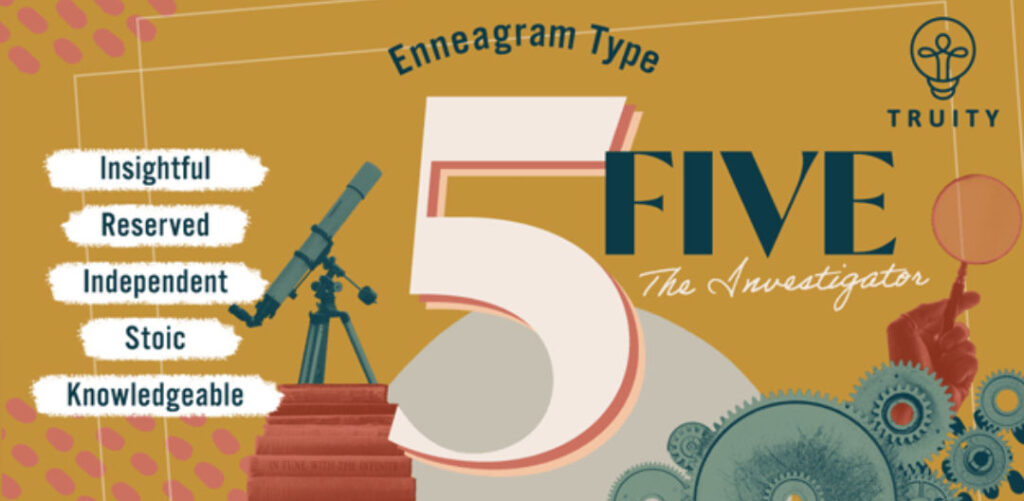
Here’s what else you should know about this test:
- Purpose: The Enneagram test provides broad insights into your personality type, similar to the MBTI test. The difference lies in its perspective, providing unique insights. So it’s another powerful option for self-discovery and self-improvement.
- Format: Answer 105 questions, taking 10~20 minutes to complete.
- Reliability: Although the Enneagram isn’t as established, the test is reliable and valid. I took this test for the first time for this review, and I can say that I understand its rising popularity.
- Costs: Free to get your Enneagram Type. And if you pay for the full report, you’ll learn more about your motivations, fears, strengths, desires, core beliefs, superpowers, blindspots, and more.
Although I had heard about the test before, I never took it until writing this review. And I’m quite happy that I did because the report provides unique insights and actionable “Growth Tasks”.
Take the Enneagram test for free
#3: Big Five Personality Test
Like the MBTI, the Big Five is one of the older personality tests. And many healthcare professionals consider this test more reliable and valid.
The main reason?
The Big Five personality traits stay relatively stable over time, known under the acronym OCEAN:
- Openness to experience
- Conscientiousness
- Extraversion
- Agreeableness
- Neuroticism
My best score was in conscientiousness.

And I scored lower than average on extraversion and neuroticism.

But it’s not about high or low.
Each side comes with its strengths and pitfalls.
The downside is that the five-factor model is that it lacks a detailed description like the first two tests. So it’s more challenging to extract actionable takeaways without the help of a personality psychologist.
That’s why I ranked it third on this list.
- Purpose: The Big Five also provides broad insights into your traits but mainly focuses on traits that stay stable over time. So if you’re still young or want to create a life plan, you may value this test the most.
- Format: Answer 60 questions, taking 5~10 minutes to complete.
- Reliability: It’s one of the most reliable and valid methods to assess personality, according to healthcare professionals.
- Costs: Free, with the option to pay for an in-depth report. This report provides details about your Big 5 preferences. You’ll also gain insights into your personality patterns and how they apply to your inner, social, and work life.
Although the results are less detailed than the other two tests, you can still gain many insights from this test. And if you’re looking for the most reliable test with stable results, the Big Five is your best option.
Take the Big Five Test for free
#4: DISC Personality Test
The DISC personality test is also an older tool. And it’s one of the most authoritative career assessments for understanding your personality and behavior in a work environment.
So you may have done several of these career tests already.
The DISC factors include four key personalities:
- Driven personalities are assertive, decisive, and goal-oriented. They often take charge and are seen as leaders by others.
- Influential personalities are outgoing, persuasive, and enthusiastic. They build relationships and are seen as motivators.
- Supportive personalities are patient, reliable, and supportive. They follow through on tasks and are real team players.
- Clarity personalities are organized, precise, and responsible. They follow the rules and are seen as perfectionists.
My DISC style is Clarity.
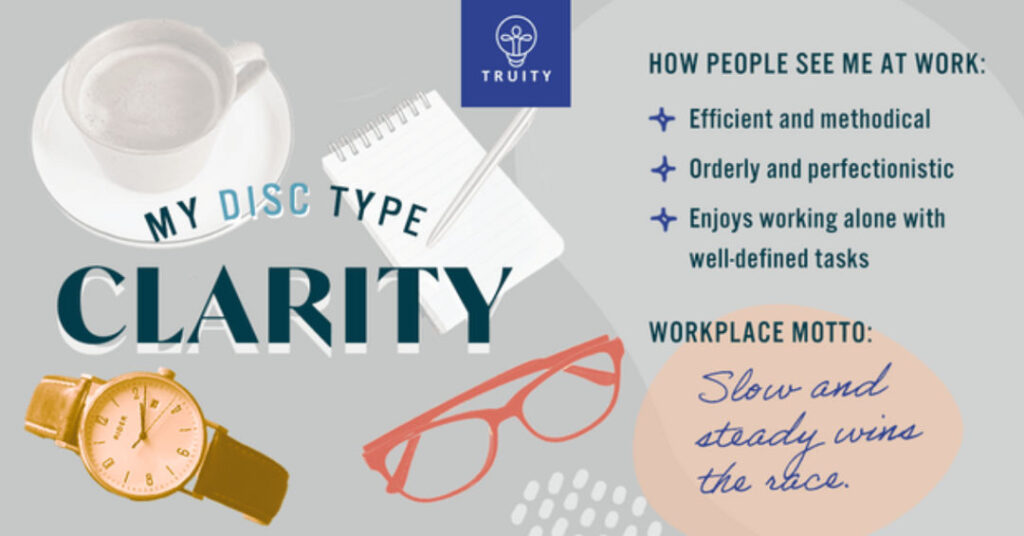
But you can fall anywhere in each of the four quadrants. And within Clarity, I fall more towards the Driven side.
So, my DISC type is Cd.
Here’s what you need to know about the DISC test:
- Purpose: DISC reveals your communication style and behavior in social situations, specifically in the workplace. You can use these strengths and weaknesses to sharpen your communication skills and improve your relationships.
- Format: Answer 54 questions, taking 5~10 minutes to complete.
- Reliability: While there’s some validity to the DISC test, it’s less reliable and valid than the other options. And since there are only four quadrants, the results can feel more stereotypical. That said, I gained an accurate perspective on my styles, strengths, and pitfalls.
- Costs: Free to unlock your leading style. And the full report dives deeper into your styles and how to use them. A section also clarifies how your DISC style interacts with other DISC personality types.
Overall, the DISC test provides insights into your communication style and social preferences. So look no further if you want to improve your relationship skills in the workplace.
#5: HIGH 5 Strengths Test
The HIGH5 Test is a newer strengths-based personality test designed to be more holistic and inclusive. It combines positive and personality psychology to offer both theoretical and applicable insights.
HIGH5 measures 20 strengths across 4 categories:

The test aims to help you identify and align yourself with your strengths. After all, leading with your strengths increases performance, motivation, and overall satisfaction.
It’s your unique way to gain an edge in your career.
For example, here are my results:
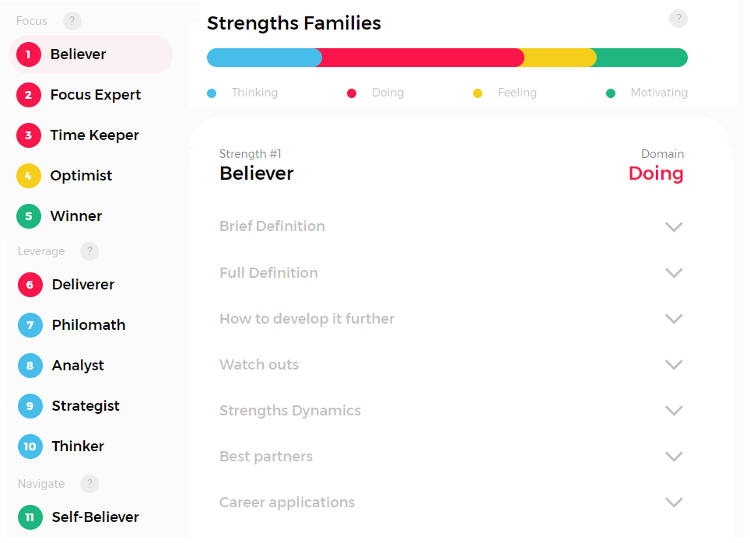
In the HIGH5 test review, I dive more in-depth. But here are the key points you should know about:
- Purpose: HIGH5 reveals your top 5 strengths – or the entire order of your top 20 in the paid report. And when you incorporate your strength into your work and life, it increases your performance and overall satisfaction.
- Format: Answer 120 questions, taking 10~20 minutes to complete.
- Reliability: The test is reliable and valid. But it’s also relatively new and still being researched and improved.
- Costs: Free to get your top 5 strengths. Upgrading to the full report provides an overview of your top 20, including detailed insights and actionable ideas to apply your top 5 strengths.
You can use the HIGH5 test to lead with your superpowers to increase overall satisfaction.
For example, I aim to work 80% of the time within my strength and 20% of the time in my area of weakness. And designing my life around my strengths increased joy, well-being, and productivity.
Take the HIGH5 test#6: VIA Character Strengths Survey
VIA stands for Values in Action.
And it’s a newer but unique personality test that measures 24 positive character traits.
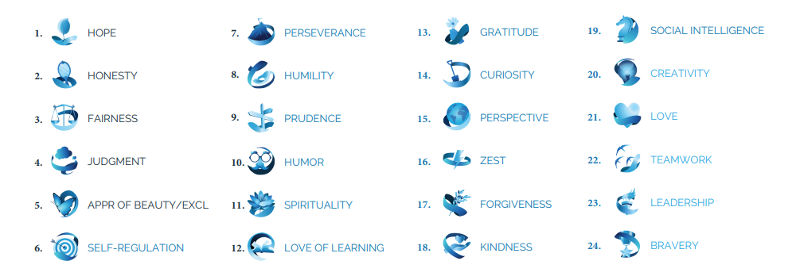
And if you’re wondering, yes, that’s the complete order of my VIA Character Strengths Profile.
You gain a score for each of these qualities from zero to five:

Here’s what else you need to know:
- Purpose: You’ll learn more about the traits that contribute most to your well-being. And when you align your decisions and actions with your values, you’ll unlock a more authentic and fulfilling life.
- Format: Answer 96 questions, taking 10~15 minutes to complete.
- Reliability: The VIA test is a reliable and valid assessment for measuring your character traits and strengths.
- Costs: Free to get your top 5 character strengths. Then, there are two upgrades. An in-depth top 5 report for $20 or the full character strengths report for $49. I bought the latter, but the first option provides better value for money and is really all most people need.
Overall, the VIA character test offers a great way to explore your positive values further. Using them helps you to make difficult decisions. And I’ve done so several times with great success.
Take the VIA Character test for free
#7: Emotional Intelligence Test
The Emotional Intelligence (EI) test measures your ability to understand and manage your own emotions, as well as the emotions of others.
Truity’s EI test is a completely free online test that measures:
- Self-awareness: Do you understand your feelings and how they affect your thoughts and behavior?
- Self-management: Can you control your emotions and stay calm under pressure?
- Motivation: Do you set goals and work towards them?
- Empathy: How do you respond to the emotions of others?
- Social skills: How do you communicate and interact with others?
For example, my EQ profile is The Rock. And its description states that I can control and regulate my emotions, even in difficult circumstances.
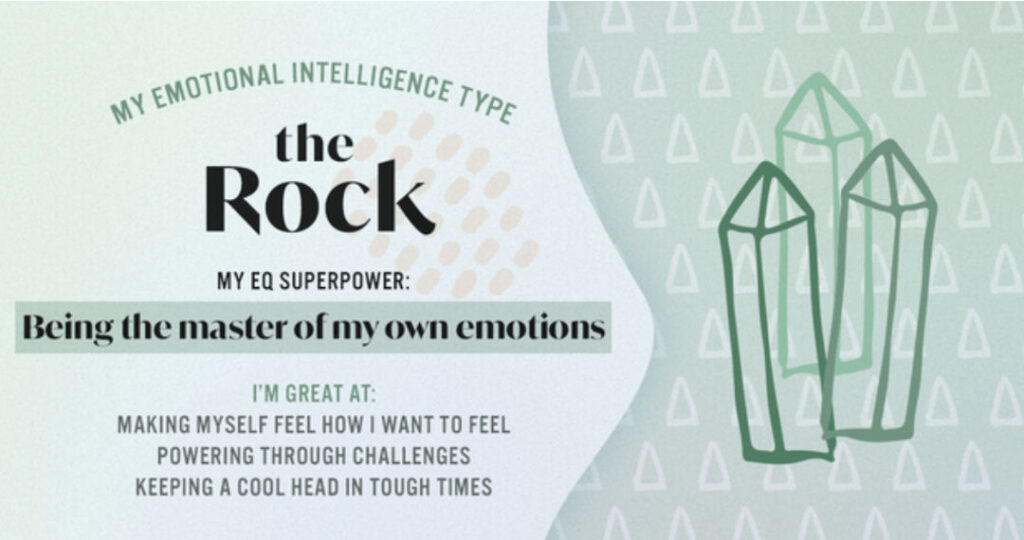
Here’s what you should know about the test:
- Purpose: You’ll gain insights into your emotional strengths and weaknesses in a personal and social context. This provides a benchmark to help you understand where to improve.
- Format: Answer 55 questions, taking 5~10 minutes to complete.
- Reliability: Emotional intelligence tests are considered valid and reliable. But they’re also relatively new and not fully developed yet.
- Costs: Free – with no option to upgrade. Unfortunately, the insights aren’t very actionable. That said, your results provide a helpful benchmark for further self-improvement.
Whereas IQ dominated the workplace over the last century, EI has become a more important factor over the previous decades.
But not only is it an essential skill for career and business success, but it also leads to greater relationships and deeper fulfillment.
Take the emotional intelligence test for freeOther personality tests you might’ve heard about
Many other personality testing assessments exist.
But they’re either less popular, focused on one area, or complex and therefore only used by personality psychologists in clinical practices.
Here’s a quick overview:
- The Career Aptitude Test measures your interests, abilities, and values to help you identify career paths that fit you. This career test is built on two well-researched models: the Hollands Code and the Big Five. It’s a great option if you want to explore career options.
- True Colors is a popular online personality test that measures four personalities: red, orange, yellow, and green. It assesses your communication style and teamwork potential. However, it lacks scientific theory and isn’t as well-researched as others.
- The HEXACO Personality Inventory Model is based on the Big Five but measures two additional traits. Its six dimensions include honesty-humility, emotionality, extraversion, agreeableness, conscientiousness, and openness to experience. And while the HEXACO personality inventory is a newer model, it’s gaining popularity in research and clinical practice.
- The Revised NEO Personality Inventory is one of the most widely used personality tests in research and clinical practice. It’s another test built on top of the Big Five personalities. And while you can take the Revised NEO Personality Inventory, it’s quite expensive, takes 45 minutes, and is most popular in clinical research.
- The Dark Triad Test measures three darker traits: narcissism, machiavellianism, and psychopathy. It’s a controversial test that aims to measure job performance, criminal behavior, and relationship satisfaction.
- The Hogan Personality Inventory measures personality types relevant to job performance, such as ambition and sociability. Employers often use it to assess job candidates.
- The Hogan Development Survey is a more comprehensive version of the Hogan personality inventory. And it measures a wider range of personality traits, including emotional intelligence, stress tolerance, and leadership potential.
- The Eysenck Personality Inventory measures three personality traits: extraversion, neuroticism, and psychoticism. It’s a classic and widely used test. But it’s fairly short and considered outdated.
- The Eysenck Personality Questionnaire is similar to the Eysenck Personality Inventory but even shorter. It’s less expensive but also less reliable and valid.
- The Minnesota Multiphasic Personality Inventory measures many personality traits and offers an extensive personality profile. However, it’s also long and complex. That’s why clinicians and not individuals mainly use it.
- The Keirsey Temperament Sorter is based on the MBTI model and measures four personality dimensions: sensing, intuition, thinking, and feeling. It’s a classic but not as well-researched.
- The Personality Assessment Inventory (PAI) is a personality test that’s considered to be reliable and valid. However, it’s also long, expensive, and complex. And it’s most commonly used by qualified clinicians to assess an individual’s personality and mental health disorders.
There are many more personality inventories. But we covered the most popular ones and many more that you won’t ever really need – unless you’ve specific reasons or love this stuff.
How to use your personality test results?
Let’s stress the fact that an online assessment doesn’t define you.
For example, there are still a gazillion differences between you and someone with the same Myers-Briggs type. There’s only one of you after all.
So while these tests provide awesome insights, they’re simply tools. Tools are only valuable in the right context. And personality tests specifically are most helpful in obtaining input for self-reflection and experimentation.
Here’s how you should use the results:
- Increase self-awareness: Reflect on your results to identify how the findings relate to your life. What matches what you know about yourself? And do you understand where the test results are coming from – even if you disagree?
- Clarity your next steps: What actionable insight can you extract? And how can you experiment and implement these ideas? The best way to find what works for you is through trial and error.
- Improve your communication: What do your results tell you about your preferences? How do others view your style? And what ideas can you try to improve your social interactions?
- Design every area of your life: What decisions should you take to live in alignment with your true self? What habits should you build? How can you lead with your strengths? And how do your answers apply to your goals, career, and relationships?
- Reflect, experiment, and stay curious: Tests reveal many insights and actionable ideas. But not everything will work for you. So reflect on your findings and experiment with ideas to see what works.
You may notice many questions in the bullets above.
And that’s because you must raise curiosity. Read and reflect on your results with an open but critical mind to extract the best insights.
That’s better than passively reading your results.
And if you want to take it up a notch, here’s…
What’s next?
We explored the world of personality tests and their potential for personal growth and self-discovery. It’s important to remember that the results never define you. That’s the only trap you must watch out for.
Reflecting on your result is key to self-awareness. And acting on actionable ideas enables you to create a more authentic and fulfilling life.
The best personality tests on the market are:
- Myers-Briggs Type Indicator
- Big Five Personality Test
- Enneagram Personality Test
- DISC Personality Test
- HIGH 5 Strengths Test
- VIA Character Strengths Test
- Emotional Intelligence Test
And if you’re interested in taking a career test to explore your options, I recommend taking the Career Aptitude Test.
Also read my review of Truity; my recommended source for online personality and career tests. Finally, check out the top 5 strength tests (both free and paid options).
Take action: Challenge yourself to take a personality test. Get the full report and read it for fun the first time. The next day, read it a second time and take notes. Finally, review the report again and write down ideas for self-improvement.
Want to dive even deeper?
Sign up below for weekly tips to create a more fulfilling life that aligns with your most authentic self.

